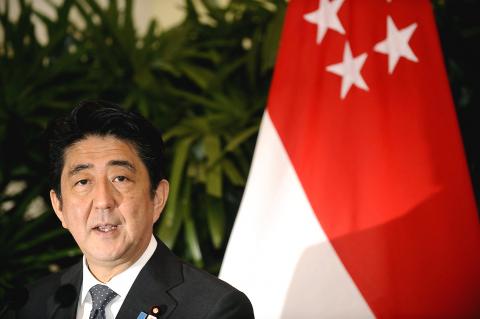Japanese Prime Minister Shinzo Abe yesterday called for a leaders’ summit or a foreign ministers’ meeting between his country and China as soon as possible, drawing a cool reaction from Beijing, which accused Japan of lacking sincerity.
Sino-Japanese ties, often fragile, have been seriously strained since September when a territorial row flared over tiny islands in the East China Sea which Taiwan also claims. Concerns that the conservative Japanese leader wants to recast Japan’s wartime history with a less apologetic tone have added to the tensions.
“I think there should be a summit meeting and also a foreign ministers meeting as soon as possible ... I think such meetings should be held without pre-conditions,” Abe said in response to a question at an academic conference in Singapore.

Photo: Reuters
China’s Ministry of Foreign Affairs said its door was always open for talks, but that the problem lay in Japan’s attitude.
“The crux of the matter at present is Japan’s unwillingness to face up to the serious problems which exist in Sino-Japan relations, and it is avoiding having earnest talks and consultations with China,” the ministry said in a statement faxed to Reuters.
Japan, it said, should “stop using empty slogans about so-called dialogue to gloss over disagreements.”
Earlier yesterday, the Japanese Defense Ministry issued a policy report repeating Japanese concerns about China’s military build-up and its activities near the islands.
The Chinese Foreign Ministry said it hoped Japan would respect the concerns of neighboring countries and “take the path of peaceful development and not artificially create and exaggerate tensions.”
The policy report called for an increase in the country’s military capabilities and a more assertive role in regional security due to increased threats from China and North Korea.
If implemented, some of the changes outlined by the interim Defense Ministry paper would be a major shift in policy for a military that is currently limited to self-defense and is banned from operating in overseas combat zones under a pacifist constitution.
The paper said Japan should increase its surveillance capability and consider using drones, or unmanned surveillance vehicles, capable of wide-range, high-altitude monitoring around the clock.
The paper also proposed creating a marine force with amphibious functions to defend disputed islands in the East China Sea. It said the Japan-US security alliance remains “the cornerstone” of Japan’s defense policy and urged Japan to step up its ability to respond to ballistic missile attacks amid concerns about North Korea’s nuclear and missile development.
A final report is expected at the end of this year.
On Friday, four ships from China’s newly formed civilian coast guard entered what Japan considers its territorial waters near the Diaoyutai Islands (釣魚台), known in Japan as the Senkaku Islands and as the Diaoyu (釣魚) in China, but left the area later without incident.
Abe also met with US Vice President Joe Biden in Singapore, after which the US restated its wish for tensions to subside.

NATIONAL SECURITY THREAT: An official said that Guan Guan’s comments had gone beyond the threshold of free speech, as she advocated for the destruction of the ROC China-born media influencer Guan Guan’s (關關) residency permit has been revoked for repeatedly posting pro-China content that threatens national security, the National Immigration Agency said yesterday. Guan Guan has said many controversial things in her videos posted to Douyin (抖音), including “the red flag will soon be painted all over Taiwan” and “Taiwan is an inseparable part of China,” while expressing hope for expedited “reunification.” The agency received multiple reports alleging that Guan Guan had advocated for armed reunification last year. After investigating, the agency last month issued a notice requiring her to appear and account for her actions. Guan Guan appeared as required,

A strong cold air mass is expected to arrive tonight, bringing a change in weather and a drop in temperature, the Central Weather Administration (CWA) said. The coldest time would be early on Thursday morning, with temperatures in some areas dipping as low as 8°C, it said. Daytime highs yesterday were 22°C to 24°C in northern and eastern Taiwan, and about 25°C to 28°C in the central and southern regions, it said. However, nighttime lows would dip to about 15°C to 16°C in central and northern Taiwan as well as the northeast, and 17°C to 19°C elsewhere, it said. Tropical Storm Nokaen, currently

‘NATO-PLUS’: ‘Our strategic partners in the Indo-Pacific are facing increasing aggression by the Chinese Communist Party,’ US Representative Rob Wittman said The US House of Representatives on Monday released its version of the Consolidated Appropriations Act, which includes US$1.15 billion to support security cooperation with Taiwan. The omnibus act, covering US$1.2 trillion of spending, allocates US$1 billion for the Taiwan Security Cooperation Initiative, as well as US$150 million for the replacement of defense articles and reimbursement of defense services provided to Taiwan. The fund allocations were based on the US National Defense Authorization Act for fiscal 2026 that was passed by the US Congress last month and authorized up to US$1 billion to the US Defense Security Cooperation Agency in support of the

A Vietnamese migrant worker yesterday won NT$12 million (US$379,627) on a Lunar New Year scratch card in Kaohsiung as part of Taiwan Lottery Co’s (台灣彩券) “NT$12 Million Grand Fortune” (1200萬大吉利) game. The man was the first top-prize winner of the new game launched on Jan. 6 to mark the Lunar New Year. Three Vietnamese migrant workers visited a Taiwan Lottery shop on Xinyue Street in Kaohsiung’s Gangshan District (崗山), a store representative said. The player bought multiple tickets and, after winning nothing, held the final lottery ticket in one hand and rubbed the store’s statue of the Maitreya Buddha’s belly with the other,